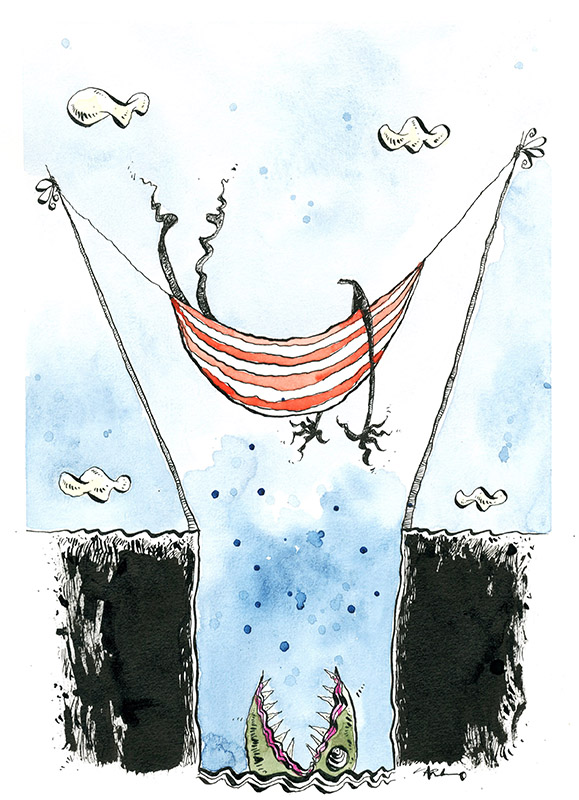AI, in the form of chatbots, proofreaders, or translators, has become part of our everyday lives and is seen as a useful helper. From a historical perspective, however, a chatbot can also negatively impact our sense of time and reinforce our anchoring in the present.
If you’re reading this in German, then you are actually reading an AI translation from English into German. Having spent four of the last five years in the UK, the reason to write in English becomes apparent. However, and more importantly, it is to prove a point about our perception of time and AI. This article would have taken me far longer to write in German because I lack the habit of writing in German. So, I wrote it in English and then had it translated by DeepL. Furthermore, in the original English text, AI corrected grammar mistakes and suggested different phrasings (AI and I are always at loggerheads when it comes to using the passive). It urged me to change some words if they were deemed too repetitive in the text, overused in general, or old-fashioned. Above all, it helps me set commas.
AI, your friend and helper
I’ve been using AI to proofread and polish texts for several years. By highlighting repetitive mistakes, one becomes more aware of them, learns to avoid them, and thus writes more efficiently. One spends less time proofreading, although one also must proofread every AI suggestion. AI can also function like a thesaurus and expand one’s vocabulary. Given all these time-saving advantages, I was tempted to ask ChatGPT questions about my own research on relations between the European Community and the Soviet Union. The result was deeply disappointing as it simply copied and pasted the text from my Cambridge profile page. I repeated the experiment for this article, and this time, it referred to the abstract of my PhD dissertation, a feature I did with the FNR, and an article from 1992. The information given was still shallow (it did not look up a longer article I wrote, and that is online), but funnily enough, the way the chatbot had summarised the abstract of my PhD dissertation suggested that the Soviet Union still exists today.
In its everyday usage, AI can be very useful in drafting letters and helping with translations. A competitive job market and the current high unemployment rate force those looking for a job to apply for many positions, and one cannot simply use one cover letter template and change a word here and there. AI can write a good, albeit very generic, cover letter, and it urgently recommends changing the proposed text to reflect the person behind it better. However, by combing through the company website, a chatbot can inform about a company’s core values, thus strengthening an application and reducing the time spent investigating a website. AI translations have recently improved vastly. Some programs learn and can clearly identify the context of the document they’re translating. Thus, even very technical texts with many acronyms can be translated correctly in a matter of seconds. Proofreading remains necessary, but the time saved with these translation bots is significant.

Combining these two tools can substantially reduce the time spent redacting letters or reports for anyone in an office setting. Still, it can equally be important for someone who needs to address an authority but is unsure about drafting formal letters or feels insecure in French, which remains the main administrative language in Luxembourg. In that light, AI translation can also be helpful for entangling bureaucratic French or German. This goes beyond saving time; it also helps with communication. Given an ever-growing community of anglophone speakers in the country and the Luxembourgish state’s administrative reliance on French, this linguistic gap can be jumped over with the help of AI and save both sides a fair amount of time.
AI in the classroom
AI goes far beyond the aforementioned, especially in the educational context. This was recently debated by the Luxembourgish Youth Parliament in the Chamber of Deputies. It called upon the government to prevent schools from banning the usage of AI and for the government to implement a strategy for AI and its usage in schools. Such a strategy is highly advisable, as an outright ban makes little sense. Banning AI in the classroom tries to anchor students in an AI-free past, leaving them completely unprepared for universities and the professional world where AI is used. Failing to prepare students to work with AI chatbots for assignments is counterproductive. Students need workshops designed to teach them how to interact with the chatbot, challenge it, and not take its responses at face value.
Furthermore, these workshops need to show how a chatbot can work in tandem with a library or an online database. To avoid plagiarism from primary and secondary sources, universities use software to detect it. A plagiarism checker should serve as an incentive for students to be as original as possible. Such software needs to be technologically expanded so that it can detect AI-generated texts, too. I copied and pasted a ChatGPT text into ZeroGPT without modifying anything, and the plagiarism software only detected a 60% chance of plagiarism, saying most was written by ChatGPT, but not everything.
The everyday usage of ChatGPT definitely has time-saving advantages, thus affecting our perception of time by simply granting us more of that precious resource. How this time is used will be determined by the individual, but it can have beneficial effects on our social interactions, well-being, and planning. Delegating small tasks to an AI is thus beneficial for our relationship with time.
Effects on our perception of the future and the past
However, there is also another side to this coin. Relying on AI changes our relationship with time. Positively for the present, as I argued before, but potentially negatively regarding the past and future. For the future, we might tend to plan less ahead, relying on AI to do the planning (or parts of it) for us. This argument can be generously stretched from organising household chores or the odd essay assignment to planning a company’s budget and administrative tasks. Optimistically as one is, not factoring in AI-related errors could lead us to delay deadlines even more than we do now. If an AI-related error occurs, though, we are confronted with too little time and intense exposure to stress. No matter how much one would scapegoat AI in that case, its health will not be affected by stress, unlike non-artificial intelligent beings. Any job advert these days contains a line on dealing with tight deadlines while society faces increasing burn-outs at a young age. While AI can reduce time spent on tasks, delaying deadlines becomes all too tempting, which would be counterproductive.
Turning to the past now, which is my métier and thus, I can be accused of bias. I see a potential danger here because AI condenses the past too much. A Wikipedia article is already a very condensed account of a past event (and that is also its purpose). Still, the information given to you by the chatbot condenses this piece of information much more into a bite-sized hap of knowledge. While it may rely on solid facts, these are still just barely touched upon. If the user does not ask the chatbot follow-up questions, a question, for example, on the nature of World War II, will be answered in 17 lines on a smartphone, not even a full page on the device. Mistakes are recurring, and false statements might go unquestioned. The pitfall I see in using AI to learn about history is that these too-condensed bits of information distort our view of the past. It is comparable to solely relying on historical movies to learn about history. While one might get the gist of it, one must also be aware that a moviemaker needs to strike a balance between fact and entertainment, with the pendulum swinging heavily in favour of the latter. An AI chatbot does not aim to entertain (although it can) but wants to deliver information quickly, to the detriment of detail.
Anchored in the present?
The follow-up question is whether this condensed view distorts our relationship with time. The further back something is situated on our historical timeline, the more we tend to romanticise it. I fear there is a potential danger of doing the same thing when events are not that old but when the knowledge about them gets very reduced. Historical events disappear from the collective memory the older they grow. The way one engages then with the past determines the state of knowledge. We can’t expect everybody to study history or to work one’s way through an amplitude of books. Will an AI chatbot do a sufficiently good job of informing?
A chatbot can do so in current affairs because there will be plenty of material on the news websites it looks up. When asking a chatbot questions about history, its answers become less satisfying, as the most frequently cited websites are Wikipedia and some other popular history sites. The latest state-of-the-art research might not be reflected therein because access to historical databases is limited, at least in the versions I tried. And because it only cites websites, it becomes tedious to find the original citation, if not impossible. Some chatbots quote their sources, others don’t. This makes it impossible to use chatbots for original academic research. For informative purposes, chatbots do a good job on current affairs but lack historical perspective.
Does this anchor us too much now in the present? Potentially, but the present is where our life is happening and not everyone needs to be a historian. Then again, the present is always better understood with the history that led us here. That is not a new problem. Ultimately, it depends on how much time we can spend engaging with history. AI can help us free up time in our daily chores, whether at home, work, or school/university. If one decides to use that time to learn about history leisurely, then AI actually contributes indirectly to improving our understanding of the past. However, we cannot rely on AI to do the latter for us.
Efficiently used, AI is a time saver, thus allowing us to have more of this precious resource. If this incites only a handful of people to pick up a history book, go to a museum, watch a documentary (or mildly accurate historical movie), go on a guided tour, or play a historical video game, then AI has done a service to the discipline. More importantly, AI can free up time for the things we love to do. That is an important feat in hectic times.
Claude Ewert is a historian of contemporary Europe and international relations. He wrote his PhD dissertation on relations between the European Community and the Soviet Union at the University of Cambridge and currently works as a Postdoctoral Researcher at the University of Luxembourg.
Als partizipative Debattenzeitschrift und Diskussionsplattform, treten wir für den freien Zugang zu unseren Veröffentlichungen ein, sind jedoch als Verein ohne Gewinnzweck (ASBL) auf Unterstützung angewiesen.
Sie können uns auf direktem Wege eine kleine Spende über folgenden Code zukommen lassen, für größere Unterstützung, schauen Sie doch gerne in der passenden Rubrik vorbei. Wir freuen uns über Ihre Spende!
